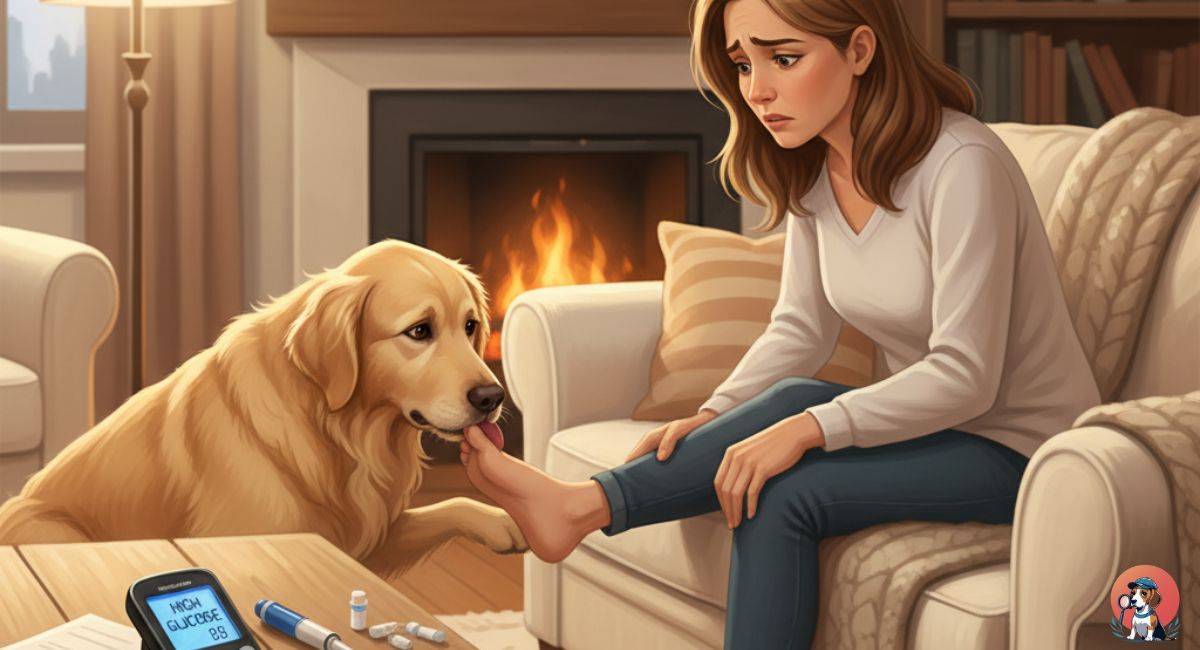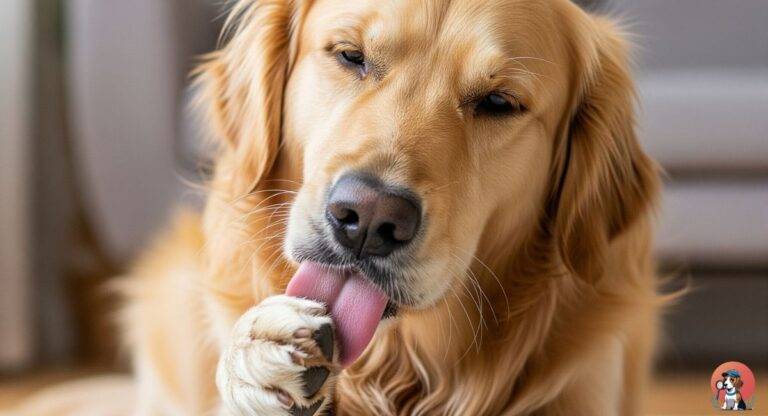When dogs occasionally lick their feet, it often appears harmless. But constant or intense paw licking can point to an underlying health issue. One commonly overlooked connection is dogs’ licking feet diabetes, where high blood sugar affects nerves, circulation, and skin health long before obvious symptoms appear.
Catching this early can help prevent infections, pain, and long-term damage.
TL;DR / Quick Summary
-
Persistent paw licking may signal dogs licking feet diabetes
-
Diabetes affects nerves, blood flow, and skin healing
-
Early action reduces infection and mobility risks
Quick Red Flags to Watch
-
Nonstop paw licking
-
Red or swollen toes
-
Slow-healing sores
-
Excessive thirst + fatigue
Why Dogs Lick Their Feet

Normal Reasons
-
Grooming behavior
-
Dirt or moisture removal
-
Boredom or low activity
-
Mild anxiety or stress
Short-term licking with healthy skin is usually normal.
Concerning Signs
-
Constant licking or chewing
-
Red, raw, or inflamed skin
-
Open wounds or bleeding
-
Limping or pain while walking
These signs may indicate infection, nerve discomfort, or diabetes-related paw issues in dogs.
How Diabetes Affects Paw Licking
High blood sugar damages peripheral nerves, causing tingling, burning, or numbness in the paws. Dogs may lick their feet to relieve this discomfort.
Diabetes also reduces blood circulation, slowing healing and weakening the skin barrier. This creates a higher risk of yeast infections, bacterial growth, and recurring sores, all commonly linked with dogs licking their feet and diabetes.
Signs That Paw Licking May Be Diabetes-Related
Paw Symptoms
-
Redness between toes
-
Swelling or thickened skin
-
Cuts that heal slowly
-
Pain or sensitivity
These are often linked to diabetic neuropathy in dogs.
Behavioral & Health Changes
-
Excessive thirst
-
Frequent urination
-
Weight loss or gain
-
Fatigue or low energy
-
Increased appetite
When these signs appear together, diabetes should be considered.
Ignoring Paw Licking: Risks
Leaving paw licking untreated may lead to:
-
Chronic yeast or bacterial infections
-
Progressive nerve damage
-
Long-term pain
-
Walking difficulty
-
Infection spreads to the legs or body
Diabetic dogs are especially vulnerable due to slower healing.
How Vets Diagnose Diabetes-Linked Paw Licking

Vets usually confirm the cause through:
-
Blood glucose testing
-
Urine tests for glucose or ketones
-
Detailed paw examination
-
Nerve sensitivity checks
-
Ruling out allergies or parasites
This ensures paw licking is not mistaken for simple skin irritation.
Home Care Tips for Managing Paw Licking
Cleaning & Hygiene
-
Rinse paws after walks
-
Use vet-approved antiseptic wipes
-
Keep paws dry
-
Consider protective booties
Diet & Supplements
-
Balanced diabetic-friendly diet
-
Omega-3 fatty acids for skin
-
Avoid sugary treats
Distraction & Exercise
-
Interactive toys
-
Daily walks
-
Gentle paw massage
-
Consistent routines
Vet Treatments for Chronic Licking
For ongoing issues, vets may recommend:
-
Insulin or medication adjustment
-
Nerve pain management
-
Antibiotics or antifungals
-
Medicated paw soaks
-
Scheduled follow-up visits
These treatments target both symptoms and the root cause of dogs’ licking feet diabetes.
Human Feet & Dog Licking Risks
For diabetic owners, caution is important:
-
Avoid licking open wounds
-
Cover cuts or cracked skin
-
Wash your hands and feet after contact
Dog saliva can introduce bacteria that may cause infections in diabetic humans.
When to See a Vet
Seek veterinary care if you notice:
-
Pus or bleeding
-
Deep or spreading sores
-
Severe swelling or limping
-
Lethargy with paw problems
-
Sores lasting more than 3–5 days
Early care prevents serious complications.
Keeping Your Dog’s Paws Healthy
Healthy paw care includes:
-
Weekly paw inspections
-
Stable blood sugar control
-
Avoiding hot or rough surfaces
-
Regular vet check-ups
See our guide on diabetic dog diet tips.
You may also find helpful: paw care routines, diabetic dog exercise tips, and vet check-up planning guides.
Helpful Guides:
FAQs
Is paw licking a diabetes symptom
Yes, especially when paired with thirst, fatigue, and slow healing.
Could it be allergies instead
Yes, but diabetes should be ruled out if licking is persistent.
How can I stop paw licking at home
Improve hygiene, manage diet, reduce stress, and monitor paws daily.
Can licking infect diabetic owners
Yes, especially if the skin is broken or healing is slow.
What is ideal home care for diabetic dogs
Consistent diet, insulin control, paw hygiene, and regular vet visits.
Conclusion / Key Takeaways
Persistent paw licking should never be ignored. In many cases, dog licking feet diabetes is the underlying issue, caused by nerve discomfort, poor circulation, and infection risk.
Early veterinary evaluation, daily paw monitoring, proper nutrition, and preventive care can help diabetic dogs stay comfortable, mobile, and protected from long-term complications.






